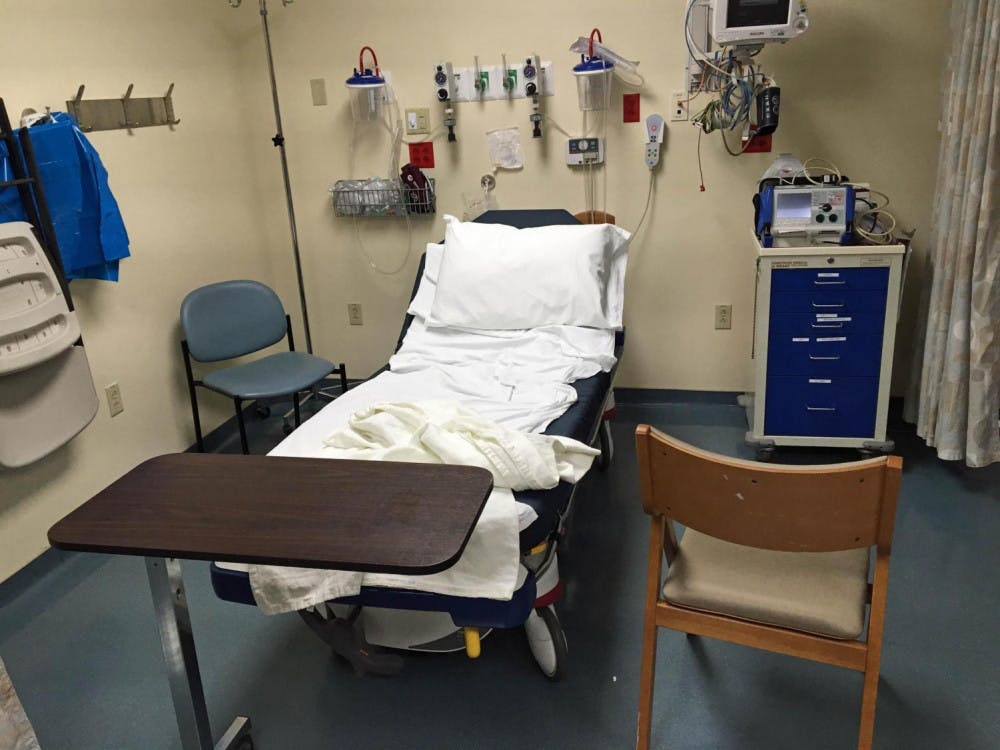SWANTON — Envision prison security guards with heavy holsters dodging psychiatric doctors and nurses rushing to check on their patients. Under Vermont Human Services Secretary Al Gobeille, this chaotic scene would become a reality. In response to the recent demand for more hospital beds for Vermont psychiatric patients, Gobeille has posited that the best place to expand would be in a temporary mental health wing at Northwest State Correctional Facility in Swanton, VT.
According to Seven Days VT, Gobeille has requested 2.9 million dollars from the House Health Care Committee (HHCC) to build the mental health wing and estimates that its annual operation would cost 6.5 million dollars. The HHCC, however, does not support this 12-bed Band-Aid solution for both policy and financial reasons.
Gobeille’s concern for the lack of psychiatric beds is ingrained deeply in his mission to alleviate the “mental health crisis,” as he puts it. In August 2017, after doctors and nurses from Central Vermont Medical Center unexpectedly arrived at Governor Phil Scott’s office for an impromptu meeting, Governor Scott assigned Gobeille to talk with the disgruntled hospital staff a day later because he was unavailable. The staff, who attempted to shed light on the psychiatric bed crisis, engaged in a dialogue with Gobeille and categorized the issue as both socially and financially urgent.
In Vermont, in order for patients to receive mental health care from a psychiatric treatment facility, they must first gain medical clearance. During the time of medical clearance assessment, patients usually reside in an emergency room bed for an extended period of time. This can be extremely problematic because emergency room resources are being over-utilized while patients are not even receiving the psychiatric help they need. Michael Brigati, the emergency department nurse director at Copley Hospital, divulged in an NPR interview, “We don’t have trained mental health counselors [here]. The environment in the ER….at times can be chaotic, loud. So it has a potential to escalate these people while they’re in crisis.” Brigati emphasizes the importance of care in which doctors not only recognize the nuanced needs of patients, but also provide them with the proper psychiatric assistance in a conducive environment.
Citizens and officials alike, however, are convinced that there needs to be a restructuring of the mental health care system in order to alleviate the crisis. According to the Vermont Association of Hospitals and Health Systems, the number of psychiatric patients admitted to private hospitals rose by nearly nine percent between the years of 2012 and 2017. This frightening statistic alongside a lack of resources has resulted in a pandemonium that has pushed Gobeille to advocate for a psychiatric wing at the Swanton prison.
The addition that Gobeille proposes would cater to those who already reside in prison and are battling mental health issues, those who cannot be criminally charged due to mental illness and those who have already been charged and are awaiting a mental evaluation. In a Vermont Public Radio podcast, Dominic Sisti, director of the Scattergood Program for Applied Ethics of Behavioral Health Care at the University of Pennsylvania, shared that, “Many times, individuals who really do require intensive psychiatric care find themselves homeless or more and more in prison. Much of our mental health care now for individuals with serious mental illness has been shifted to correctional facilities.” It seems that Gobeille has used these national cues to inform what he sees as the wisest and most feasible course of action for the expansion and evolution of the Vermont mental health system.
Gobeille’s temporary solution focuses on the way mental health systems can dole out aid. The Vermont Human Services Secretary claims that patients who are required by the state to seek out mental medical care in prisons often end up remaining in the hospital beds for prolonged periods of time due to the intricacies of their legal rulings. In turn, this creates congestion in the system and does not allow for efficient patient care.
Not only are there underlying issues in the accessibility of mental health care, but the House Health Care Committee also stands in Gobeille’s way. Committee chair Alice Emmons does not see Gobeille’s resolution as a viable option. In an interview, she expressed concern for the cost and purpose of temporarily establishing a wing in Swanton. She urges Gobeille and other officials to focus more on a long-term mental health system plan, in which more resources are allocated to pre-existing facilities, increasing the number of available bends and post-treatment housing.
While Gobeille’s hospital-prison complex is making headlines, he also offers a longer-term plan related to his temporary solution. Approximately 45 times the cost of the Swanton extension, the creation of a 925-bed St. Albans prison complex is part of what Gobeille and other officials see as a “silver bullet” solution. Gobeille proposed that this future prison would house both male and female patients regardless of their need for psychiatric assistance. The House Health Care Committee, however, has once again formally vetoed this idea for fear that it would exhaust resources for a temporary plan and would, for the first time, segregate patients who seek out help through the criminal justice system. Representative Anne Donahue recognizes the reframing of mental health issues as one that is challenging to justify because inmates would be separated from other patients despite needing the same medical treatment.
Other critics of Gobeille’s plan include Wilda White, the executive director of the advocacy program Vermont Psychiatric Survivors. She claims that, “This is not a system that needs more capacity to deal with crisis. This is a system that needs more capacity to deal with prevention and early intervention.” White sees salvation in the creation of a structural support system that includes local therapy, more post-treatment housing, and education programs.
Despite varied ways of addressing the mental health system, one thing officials and citizens can agree on is the need to quickly resolve these problems. With the federal government phasing out an exemption program that allowed Medicaid funds to be invested in mental health facilities with 16 or more beds, officials must scramble to reach an agreement before the state loses this federal funding. The exemption, according to Seven Days, foots the cost for over half of the mental health patient beds. The CEO of the Brattleboro Retreat, Louis Josephson, said, “We think we have a problem now? We haven’t seen anything.” While the Scott administration grapples for other alternatives after both of their proposal rejections, the goal is clear: find room and care for patients in need.




